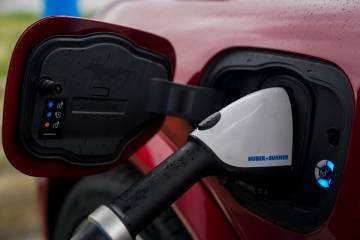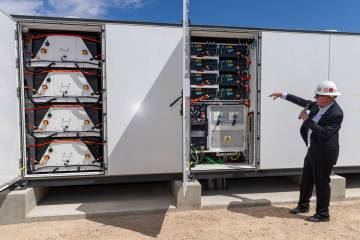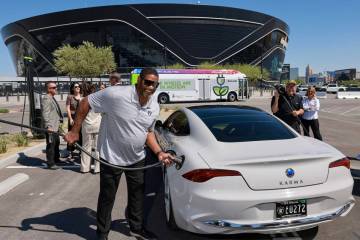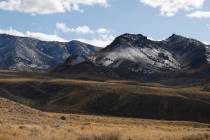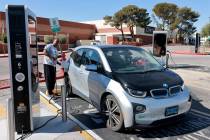Green energy is good economics, former President Clinton says
Quit piddling around!
That was the earnest exhortation from former President Bill Clinton, who spoke to a sold-out crowd of 900 attendees at today's National Clean Energy Summit 2.0 at UNLV.
In a wide-ranging speech, Clinton referred repeatedly to the 7 million jobs the nation has lost since the recession's 2007 beginning. He talked of restoring some of those jobs by unlocking private capital locked down in an ongoing credit freeze, and he urged the nation to take what Nevada is doing and put it on steroids to develop a green economy.
But achieving those goals will first require convincing naysayers that green energy can be good economics, Clinton said. It's a particularly relevant point to make in Nevada, with its nation-leading foreclosure rate and 12.3 percent joblessness.
Focusing on energy efficiency and clean power wouldn't just create jobs; it would reap huge savings for consumers and give the environment a major boost, Clinton said. The American Council for Energy Efficiency has said investments in retrofitting and green fuel would cut $2 trillion from Americans' power bills by 2050, and such investments would provide up to half of the greenhouse-gas emissions cuts a law pending before the Senate would require, Clinton said.
What's more, a Kinsey report found that a $520 billion investment in weatherization and energy retrofitting nationwide would cut energy for heating and power generation by 23 percent and allow consumers to save $1.2 trillion. Closing 22 percent of the country's older, smaller coal-fired power plants would cut coal-plant emissions by half or more.
"I say all this because, while some things have been done, we're in a country that has just lost 7 million jobs," Clinton said. "We're still just playing with this."
For an idea of the job formation that could accompany a more serious effort, Clinton reeled off a comparison of employment growth by energy type. Every $1 billion invested in a coal-fired power plant creates about 800 jobs. Investing $1 billion in a solar thermal plant generates 1,900 jobs. Wind energy performs better yet, with $1 billion yielding 3,300 jobs. And building retrofits for energy efficiency? They create 6,000 positions for every $1 billion invested, Clinton said.
Clinton pointed to $18 billion in federal funds, including $13 million for Nevada, directed toward such retrofits. Retrofitting 40 percent of the nation's buildings in 40 years would create 625,000 sustained jobs.
"But we are still piddling with this," Clinton said. "We have to figure out how to do it on a national scale and show how it can be done on an international scale."
Clinton said he's convinced the public remains cool to renewable energy and retrofits because the sector lacks "parallel financing," and because costs come up front while benefits materialize over many years. The consumer who wants to borrow money for home retrofits will find that such loans are fairly expensive and don't have terms lasting more than a year or two.
Clinton suggested two solutions: Decoupling utility revenues from electricity sales, so that power companies can earn profits even as they sell less electricity; and freeing $520 billion from banks, who, Clinton said, currently have $900 billion in cash on hand that they haven't yet committed to loans.
One innovation that could help unlock those dollars would be a retrofit-loan program similar to the U.S. Small Business Administration's business-loan guarantees, Clinton suggested. Capitalize it on a ratio of one to 10, then that $18 billion in retrofit funds appropriated in the federal stimulus bill becomes $180 billion with loan programs.
"You've got to get the banks involved in this if you want to quit piddling around," Clinton said. "We don't need 625,000 jobs gradually built over 10 years. We need 3 million jobs today."
Local initiatives that "put local consumers in a just-say-yes position" will help as well. For example, some counties allow homeowners to pay off retrofits over a period of years on their property-tax burden. And the federal Energy Department is working on plans to let people build improvements into their monthly mortgage payments.
"We need to pick the low-hanging fruit. We've lost 7 million jobs. No one is thinking about this on a scale. It is so simple." Clinton offered another suggestion for goosing the green economy.
He proposed a program similar to Cash for Clunkers that would target buyers of electric cars. Such an initiative could provide $10,000 for car buyers trading in internal-combustion cars.
"(Cash for Clunkers) has worked like a dream. It proves the American people will bite if it makes good economic sense," he said. Clinton urged attendees to reach for more than Congress and state legislatures have delivered.
"Don't be satisfied with $40 billion in 10 years. Do it all in the next five years. Put millions to work and prove this is the right thing to do. Let's get some way for the American financial and enterprise system to be able to work again to prove this is good business."
Contact reporter Jennifer Robison at jrobison@reviewjournal.com or 702-380-4512.





